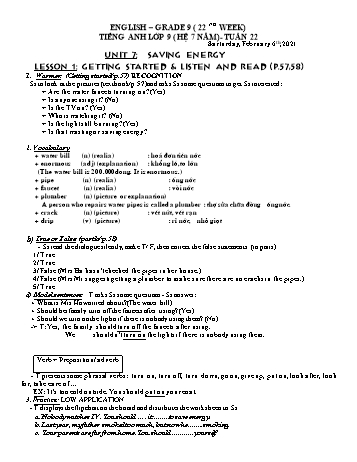Giáo án Tiếng Anh Lớp 9 (Hệ 7 năm) - Tuần 22 - Unit 7: Saving energy
Unit 7: saving energy
Lesson 1: Getting Started & Listen and Read (p.57,58)
- Warmer: (Getting started/ p.57) RECOGNITION
Ss to look at the pictures (textbook/ p.57) and asks Ss some questions to get Ss interested:
+ Are the water faucets turning on? (Yes)
+ Is anyone using it? (No)
+ Is the TV on? (Yes)
+ Who is watching it? (No)
+ Is the light still burning? (Yes)
+ Is that wasting or saving energy?
2. Vocabulary:
+ water bill (n) (realia) : ho¸ ®¬n tiÒn níc
+ enormous (adj) (explanation) : khæng lå, to lín
(The water bill is 200.000 dong. It is enormous.)
+ pipe (n) (realia) : èng níc
+ faucet (n) (realia) : vßi níc
+ plumber (n) (picture or explanation)
A person who repairs water pipes is called a plumber : thî söa ch÷a ®êng èng níc.
+ crack (n) (picture) : vÕt nøt, vÕt r¹n
+ drip (v) (picture) : rØ níc, nhá giät
b) True or False: (part b/ p.58)
- Ss read the dialogue silently, make T/ F, then correct the false statements (in pairs)
1/ True
2/ True
3/ False (Mrs Ha hasn’t checked the pipes in her house.)
4/ False (Mrs Mi suggests getting a plumber to make sure there are no cracks in the pipes.)
5/ True
Tóm tắt nội dung tài liệu: Giáo án Tiếng Anh Lớp 9 (Hệ 7 năm) - Tuần 22 - Unit 7: Saving energy

lse: (part b/ p.58) - Ss read the dialogue silently, make T/ F, then correct the false statements (in pairs) 1/ True 2/ True 3/ False (Mrs Ha hasn’t checked the pipes in her house.) 4/ False (Mrs Mi suggests getting a plumber to make sure there are no cracks in the pipes.) 5/ True d) Model sentences: T asks Ss some questions - Ss answer: + What is Mrs Ha worried about? (The water bill) + Should her family turn off the faucets after using? (Yes) + Should we turn on the lights if there is nobody using them? (No) -> T: Yes, the family should turn off the faucets after using. We shouldn’t turn on the lights if there is nobody using them. Verb + Preposition/ adverb - T presents some phrasal verbs: turn on, turn off, turn down, go on, give up, put on, look after, look for, take care of EX: It’s too cold outside. You should put on your coat. 3. Practice: LOW APPLICATION - T displays the flipchart on the board and distributes the worksheets to Ss. a. Nobody watches TV. You should . it ........to save energy. b. Last year, my father smoked too much, but now he........ smoking. c. Your parents are far from home. You should ...........yourself. d. I lost my pen. I have . it for all morning. - Ss complete the sentences, using the phrasal verbs above in groups of four. KEY: a. turn .off b. gives up c. take care of d. looked for 4. Production: HIGH APPLICATION * Write sentences with the situations, using the phrasal verbs in the brackets: a. It's too cold. (put on) b. It's too dark. (turn on) c. The lights are burning. (turn off) d. He drinks too much. (give up) - T asks Ss to work in pairs - T gets feedback. 1/ You should put on your coat. 2/ You should turn on the lights. 3/ You should turn off the lights. 4/ He should give up drinking. * Ss answer the question: What should you do to save energy for your school or your house? 5. Homework: - Learn by heart phrasal verbs, new words....- Let’s - I prefer to - No. I don’t want to. * Suggested answers: B: Why don’t we turn down the gasfire? C: I think we should turn off the electric fan? D: I suggest turning off the air conditioner. E: Shall we turn off the lights and the TV before leaving the room? F: How about turning off all the faucets before going out? I suggest fixing the faucets. G: Let’s travel by bike instead of motorbike. H: What about using the public transport instead of private motorbike? Let’s go to school by bus. “What do you do to save energy for your class and your house?” Ex: Turn off the lights. Go to school on foot or by bicycle. (To check if Ss master suggestions and responses ) + Put the garbage bins around the school yard. + Turn off the faucets after using. + Use energy - saving bulbs. + Check the water pipes regularly. + Fix the dripping faucets. Ex: A: I think we should take a shower instead of a bath to save energy. B: That’s a good idea. C: How about making posters on energy saving and hanging them around our school? D: Great! Let’s do that. * Homework: - Learn by heart the suggestions and the responses. Học sinh viết bài vào vở( nội dung là những dòng được in đậm- nếu có thắc mắc các em vào nhóm messenger của lớp mình để cô giải đáp nhé- Rất mong sự hợp tác viết bài và trả lời các câu hỏi từ các em.) Good luck and happy!
File đính kèm:
 giao_an_tieng_anh_lop_9_he_7_nam_tuan_22_unit_7_saving_energ.docx
giao_an_tieng_anh_lop_9_he_7_nam_tuan_22_unit_7_saving_energ.docx

